Update (1658ET): Stifel's Chief Washington Policy Strategist, Brian Gardner, suggests that if today's meeting between McCarthy and Biden fails to produce a pathway to an agreement, market volatility could increase on fears over missing the X-date.
If President Biden and Speaker McCarthy can close the gap between them, then negotiators can work on the details during the week. It is unlikely that Congress would be able to pass a long-term debt ceiling bill by the end of the week, but if an agreement is in place by Friday, then Congress could pass a short-term suspension of the debt ceiling. This would create the time to write the legislation and provide Members of Congress several days to review the bill (which Republicans would insist on) before voting on it.
That said, chances of a deal are uncertain given the current lack of urgency among 'significant blocks of lawmakers on both sides of the aisle.' If no framework emerges by the end of the week, Gardner thinks it will come down to public pressure to dictate how long the standoff lasts.
If the X-date is breached, Treasury will prioritize the payment of principal and interest on US Treasurys, so the chance of them defaulting is virtually nil. That said, it's possible that Social Security payments, or military paychecks could be delayed - which would of course increase political pressure, and thus, the chances of a deal - yet which could also carry the risk of a downgrade in the credit rating of US government debt.
Interestingly, Gardner also thinks that if the standoff is able to make it until June 15 - when quarterly tax payments are due - it might allow the debate to continue into July.
Goldman (which Pro subscribers can find in the usual place) gets a little more specific, writing on Saturday that "A deadline of June 8 or 9 would affect a narrower range of payments. After June 2, there is no Social Security payment again until June 14, and the next coupon payment is due June 15, when the Treasury is likely to be taking in a large amount of tax revenue due to the quarterly tax deadline."
And for a 'fun' lookback at how we got here (don't hyperbolic charts usually end well?);
More recently:
* * *
Update (1600ET): In another letter to Congress, Treasury Secretary Janet Yellen was re-warned that it’s now “highly likely” that her department will run out of sufficient cash in early June, and repeated her warning that the moment could come as soon as June 1.
“I am writing to note that we estimate that it is highly likely that Treasury will no longer be able to satisfy all of the government’s obligations if Congress has not acted to raise or suspend the debt limit by early June, and potentially as early as June 1,” Yellen said Monday in a letter to lawmakers.
Full letter here:
This fits with Goldman's warning:
We estimate that as of May 17, the Treasury had around $160bn in cash and extraordinary measures remaining. Through June 1, we estimate that the Treasury will use around $85bn in room under the limit (a $130bn cash deficit offset by a $45bn reduction in intragovernmental debt), leaving around $75bn in headroom. By June 8-9 we estimate this would drop under $30bn, which is the minimum balance the Treasury has used in the past to project the debt limit deadline (Exhibit 1).
However, the estimate is subject to substantial uncertainty so there is certainly a chance that receipts could slow more than expected and leave the Treasury short of cash by June 1 or 2.
Which probably explains why the short-term Bill market is at its most spooked yet...
Although it is a low probability, Stifel warns that there is a chance that if the standoff lasts to June 15, it might extend into July. Quarterly tax payments, due on June 15, could provide Treasury enough cash to meet all obligations into July and, in this case, Congress and the White House could conceivably use all of that time to negotiate a debt ceiling agreement. The amount of pressure brought to bear by the public and financial market’s reaction will likely determine how long the standoff lasts.
However, most ominously, Stifel notes that many lawmakers in each party think the other party will bear the brunt of public anger if the debt ceiling is not raised which could mean the debt ceiling standoff lasts past this week.
Today’s White House meeting could signal which path Washington takes.
* * *
President Biden and House Speaker Kevin McCarthy (R-CA) are scheduled to meet at 4:30 p.m. ET on Monday afternoon to attempt to get the debt ceiling negotiations back on track in the hopes of reaching a deal that could pass both the Republican-led House and Democratic-led Senate, after talks broke down over the weekend.
The two have as few as 10 days to get a deal done to raise or suspend the debt ceiling before the US Treasury runs out of cash and other options to keep the lights on - with Biden cutting his G-7 trip short by four days, while speaking with McCarthy from Air Force One as he made his way home.
"It went well," Biden told reporters late Sunday following his arrival at the White House, adding "we'll talk tomorrow."
Both Biden and McCarthy have vowed to avoid defaulting on the nation's obligations for the first time in history, despite disagreements over how to proceed The GOP has insisted that any increase in borrowing be accompanied by steep cuts in government spending - and passed a House bill in April to accomplish this, while Democrats want a 'clean' increase with no strings attached. For months, Democrats have refused to negotiate, and only entered into talks in the last week as the deadline approached, the Wall Street Journal reports.
"The gap in the top line numbers continues to be the biggest barrier to a deal," said Rep. Dusty Johnson (R-SD), chair of the Main Street Caucus of nearly 100 Republicans.
Biden has said he would like to work to narrow the deficit with some tax increases to wealthy Americans, but McCarthy said tax increases are off the table. Democrats have accused Republicans of seeking draconian spending cuts that they said would hurt education and healthcare research programs.
GOP lawmakers also want to attach changes to permitting rules that would speed the process of building energy projects and to strengthen work requirements for government benefit programs, notions that the White House has signaled some openness to.
Democrats want the debt ceiling increased until after the 2024 election, while Republicans’ original bill pushed the next debt ceiling deadline to March 2024. -WSJ
The impasse has begun to translate to Wall Street jitters - with Treasury Secretary Janet Yellen twice warning that the so-called "X-date" - the day treasury reserves fall too low to cover expenses - could arrive as soon as June 1, and Fitch and Moody's ratings agencies warning that they could place the country's credit under review if the X-date comes too close.
In 2011, a similar standoff between the Obama-led Democrats and Republicans prompted S&P to lower its rating of US debt, sending markets reeling.
Goldman Sachs and other financial firms have projected the date to fall around June 8 or 9, which would give Congress another week to act.
"We do expect investors’ concerns to mount as the X-date approaches, particularly if there’s no solution and the sides look wide apart," UBS managing director and chief U.S. economist, Jonathan Pingle, told The Washington Post. "As we approach, we basically see equity markets are increasingly likely to sell off, volatility indexes move higher, and there are going to be shifts and concerns in financial markets that aren’t going to be great to live through."
"My sense is that if we get toward the end of the coming week and the rhetoric is dark, we’ll see a lot more red on the screen," said Mark Zandi, chief economist at Moody’s Analytics , adding that "global investors are more panicked than domestic investors."
Before talks broke down on Friday - with Republicans rejecting a White House offer to freeze, rather than reduce spending, the GOP's top negotiator, Rep. Garret Graves (LA) offered a proposal to cut federal spending by more than $1200 billion in the coming fiscal year, and to cap most agencies' budgets through the 2030 fiscal year, according to the Post, citing two people familiar with the offer who spoke on condition of anonymity. The GOP proposal - which was essentially their April bill which was approved by the House - also called for tougher immigration enforcement at the southern US border.
The White House responded to the offer, countering with a freeze on spending in the 2024 fiscal year to 2023 levels, arguing that it would represent a cut because budgets would not rise with inflation, according to WaPo.
Republicans outright rejected that counter, insisting that domestic spending must undergo a significant cut so that overall spending drops in the upcoming fiscal year.
On Monday, the House Freedom Caucus is expected to urge McCarthy to reject any offer from Biden unless it includes beefed up border security, cuts to the FBI, and every provision in the House-passed bill.
"The Freedom Caucus will vote next week to basically accept only what we have sent to him plus what we’re adding to it," according to Rep. Ralph Norman (R-SC), a member of the caucus.
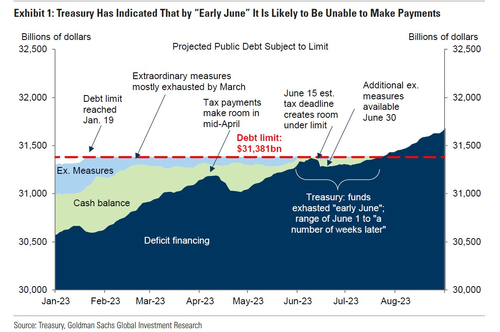
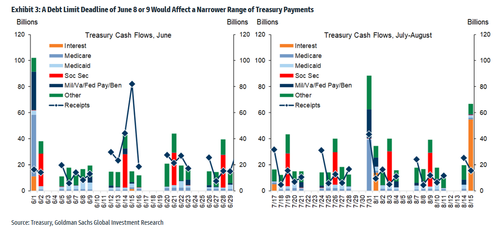
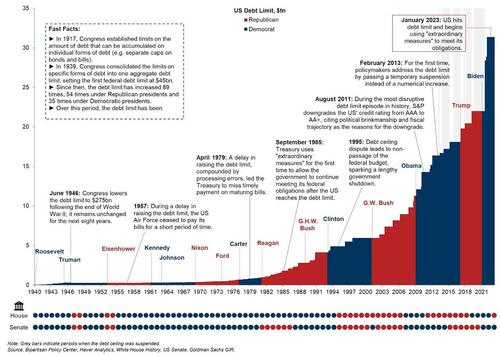
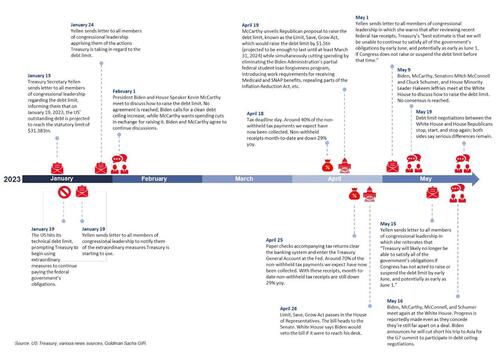
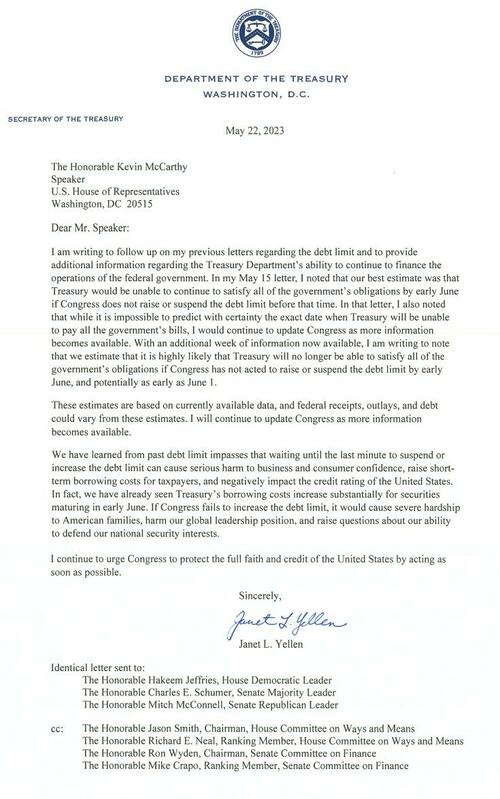
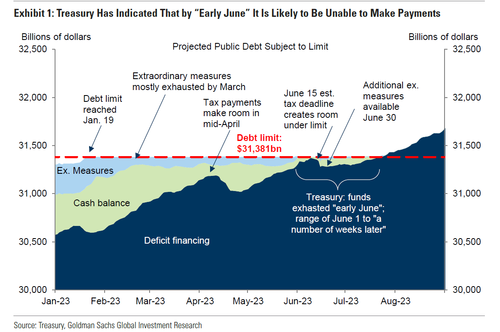


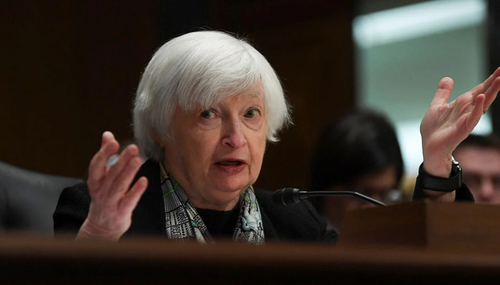
No comments:
Post a Comment
Note: Only a member of this blog may post a comment.